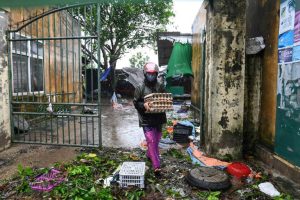The El Fasher Resistance Committees call for urgent action to break the siege imposed on the city by force.
A member of the El Fasher Resistance Committees warns of a potential famine in the state.
The UN Human Rights Commission condemns the killing of about ninety civilians.
The situation faced by civilians in El Fasher is beyond imagination; the city has become a target for militias. Between almost daily attacks and counterattacks, dozens and even hundreds of casualties are caught in the clashes and subjected to systematic executions.
Hunger dominates the scene, local food distribution centers have stopped, and health services are nonexistent after hospitals were bombed. The city is under a tight siege, and civilians inside have become human shields in a war directly targeting them. Despite appeals, the war continues, and no party in this conflict shows readiness for a truce to save the lives of hostages in El Fasher. The international community also fails to make effective efforts.
This is a tragedy appealing to the Sudanese and global conscience in vain.
Breaking the Siege:
The El Fasher Resistance Committees yesterday called for urgent action to break the siege imposed on the city by force, considering that relying solely on “the resilience of the residents” without actual intervention poses a danger to the future of the city and its inhabitants.
The committees stated in a statement that “El Fasher is not a legend but a real city exhausted by repeated attacks and a suffocating siege for more than two years,” noting that the city has suffered over two hundred armed attacks, enduring shortages of food and medicine and severe blows to its social and moral fabric.
The statement confirmed that El Fasher has paid “a heavy price that cannot be compensated by praise or glorification of heroism,” warning that resilience, when left alone, turns from heroism into a burden. It added: “No city is invincible forever, nor can a victory last without support from action,” warning against repeating the experience of other cities like Nyala, which fell after a long siege.
The Resistance Committees emphasized that “the logic of reality demands action to break the siege on El Fasher,” calling on political, military, and community forces to bear their responsibilities and not be content with verbal support or symbolic speeches.
Potential Famine:
A member of the El Fasher Resistance warned of a potential famine in the state due to the closure of several food distribution centers alongside massacres in the state, telling Al-Midan that the camps are living tragic conditions of food and medicine shortages.
He pointed to the spread of malnutrition among children alongside the spread of cholera, revealing that citizens are subjected to violations and cases of rape of women.
Condemnation:
In the same context, the United Nations Human Rights Commission condemned the killing of about ninety civilians, including sixteen summary executions, following an attack by the Rapid Support Forces militia on El Fasher city and the Abu Shouk IDP camp in North Darfur.
Jeremy Laurence, the commission’s spokesperson, expressed at a UN press conference in Geneva on Friday his fear that the actual number might be higher. He added that the situation in El Fasher has reached a critical point, with an increasing risk of famine in the city and other areas of the state, according to UN media.
Outbreak Cases:
Darfur witnessed a cholera outbreak yesterday, with 242 new cases recorded today, including 8 deaths. This brings the total number of cases since the outbreak to 7,780, including 330 deaths. The areas with the highest cholera rates are: Tawila, with a total of 4,642 cases since the outbreak, including 76 deaths. Currently, 74 cases are in isolation centers, with 50 new cases recorded today.
Rubia area: total daily cases since the outbreak reached 249, including 13 deaths, with 15 new cases recorded today. Jebel Marra areas: Golo, with a total of 1,180 cases since the outbreak, including 51 deaths.
Jeldo: total daily cases reached 80, including 9 deaths. Nertiti: cumulative daily cases since the outbreak reached 62, including seven deaths, with 11 new cases recorded today. Rokero: cumulative daily cases since the outbreak reached 145, including 11 deaths. Fanga: cumulative daily cases reached 60, including three deaths. East Jebel Marra, Deira: cumulative daily cases since the outbreak reached 149, including nine deaths. Currently, 47 cases are in isolation centers. In the Fina area, two cholera cases were confirmed. Dobo Al-Omda: cumulative daily cases since the outbreak reached 17, including 3 deaths. Sortoni camp: cumulative daily cases reached 57, including six deaths.
Kilma camp: cumulative daily cases reached 435, including 64 deaths. Atash camp: cumulative daily cases since the outbreak reached 208, including 51 deaths.
Dreij camp: cumulative daily cases since the outbreak reached 123, including 4 deaths. Cases were also recorded in Al Salam camp.
In East Darfur, in Khazan Jadid area: cumulative daily cases since the outbreak reached 89, including 18 deaths. The cholera outbreak continued spreading to Zalengi. In Al-Hamidiyah and Al-Hasaheesa camps, cumulative daily cases since the outbreak reached 75, including two deaths. In Khamsa Daqeeq camp, cumulative daily cases reached three, including one death. In Azum area west of Zalengi, cumulative daily cases since the outbreak reached 109, including two deaths. In Zalengi, cumulative daily cases since the outbreak reached 89. In the agricultural area of Kambo Weir east of Zalengi, cumulative daily cases reached two, and in Orkom south of Zalengi, cumulative daily cases since the outbreak reached four.
The epidemic continues to spread in many Darfur areas, especially Tawila, Jebel Marra, Zalengi, Nyala, Khazan Jadid in Shaeria locality, and displacement camps, where the disease spread at unprecedented rates. Despite shortages of medical supplies and isolation centers, humanitarian organizations, local volunteers, emergency rooms, and local authorities are making tremendous efforts to combat the disease. However, significant difficulties and challenges remain due to increasing infection rates, threatening lives and representing a forgotten nightmare and humanitarian disaster in a country torn by war, famine, and disease.
We appeal to the World Health Organization and relevant institutions to take effective and urgent measures to prevent this health and humanitarian emergency facing the Sudanese community in displacement areas where the epidemic is spreading.













Recommended for you
Exhibition City Completes About 80% of Preparations for the Damascus International Fair Launch
Talib Al-Rifai Chronicles Kuwaiti Art Heritage in "Doukhi.. Tasaseem Al-Saba"
Egypt Post: We Have Over 10 Million Customers in Savings Accounts and Offer Daily, Monthly, and Annual Returns
Unified Admission Applications Start Tuesday with 640 Students to be Accepted in Medicine
His Highness Sheikh Isa bin Salman bin Hamad Al Khalifa Receives the United States Ambassador to the Kingdom of Bahrain
Al-Jaghbeer: The Industrial Sector Leads Economic Growth